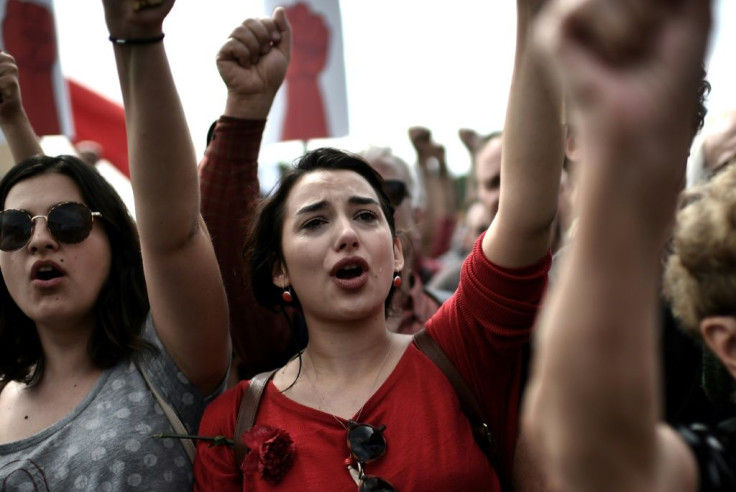Unions Go Virtual As Virus Wipes Out May Day Marches

Millions of workers traditionally take to the streets for May Day marches, but with half of humanity in lockdown, this is going to be a May 1 like no other.
With rallies cancelled in many countries because of the coronavirus pandemic, unions are instead urging supporters to deck their homes and balconies with banners or take to social media to spread the message.
Britain's Trades Union Congress shelved its planned events last month but said "it was more important than ever to mark the contribution that workers make", especially as staff in the country's heavily-unionised National Health Service are risking their lives fighting the virus.
They have urged people to post a "short video to social media thanking a worker who's made a difference to you" with the hashtags #mayday and #ThankAWorker.
While US and Canadian unions show their muscle on Labor Day in September, and the holiday is marked on different dates in Australia and New Zealand, in Europe and much of Asia activists have being forced to go virtual by the lockdowns.
In France, where large marches are usually held in most major cities, the labour movement is determined to make an impact despite the restrictions.
"Even locked down, let's all demonstrate on May 1 with placards and banners (at home) or by invading social media," they said in a joint rallying call.
They want particularly to highlight the "forgotten" low-paid workers who "at the risk of their own lives" are keeping society going, like health workers, supermarket staff and binmen.
The unions see the crisis as a chance to press the case that they finally get their due.
In Italy, one of the nations worst-hit by the virus, the traditional May Day concert in Rome will go ahead but without a physical audience.
Several major Italian stars are due to appear in the show called "Work in Safety: Let's Build the Future", which will instead by broadcast live by public service broadcaster Rai 3.
While Greece's biggest union, the GSEE, has urged its members to "respect the rules banning gatherings of more than 10 people" imposed by the government last month, there still could be some gatherings.
Having come through a decade of swingeing austerity and economic crisis, and with a new global recession on the horizon, communist unions may yet organise a symbolic protest outside parliament.
In Indonesia, unions are also set to go ahead with a march in Jakarta, despite a police ban.
There is also controversy in Uruguay, where President Luis Lacalle Pou has refused the biggest union movement, the PIT-CNT, airtime for a May Day address.
In Russia, the massive parade organised by unions linked to the Kremlin has fallen victim to the virus.
This May 1 is "unprecedented in union history", the French historian Stephane Sirot told AFP.
"The only comparison I can think of is during times of war," he said.
"This is the first time that a public health issue has come into play."
But in China, where the coronavirus first appeared in December according to official reports, things have not just been getting back to normal -- the government has actually extended the traditional May 1 public holiday by two days in the hope of boosting retail and tourism.
In Sweden, however, which unlike the rest of Europe has taken a controversially light touch approach to the virus, all marches have been called off.
Like its Scandinavian neighbours, activists are going online with Denmark's biggest union, FH, launching a Facebook campaign under the banner, "Stronger together but everyone staying safety apart".
The day coincides with the traditional spring festival of Vappu in Finland, which can get a little raucous with copious quantities of "sima" mead and "skumppa" sparking wine being drunk by revellers.
The carnival atmosphere has somewhat been dampened this year by the lockdown and the police threatening to shut public parks to make sure there are no illicit gatherings.
In Iran -- one of the countries that has suffered most from the virus -- May Day rallies have long been frowned on because of their links with Marxism.
Despite a ban on marches, every year some activists risk arrest by taking to the streets anyway.
But in North Africa, Morocco's CDT union and the UGTT in Tunisia are playing it by the book by taking the online option.
Yet historian Sirot wonders how long such virtual activism can go on with so many workers at risk from the meltdown in the global economy the virus has brought.
"It is going to be very complicated for the unions," he told AFP.
"Mass rallies, which are one of their essential tools, will continue to be banned even as countries end their strict lockdowns.
"Union activism is all about marches, lots of meetings" and face-to-face contact, and in an age of social distancing, that is going to be tricky, Sirot added.
© Copyright AFP 2024. All rights reserved.





















